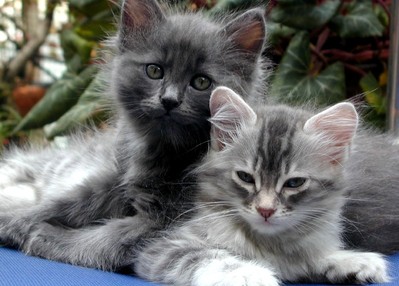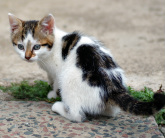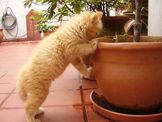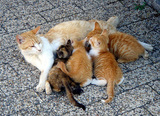Kittens
A kitten is a domesticated cat (Felis catus) that is not yet fully grown.
Birth and development
A feline litter usually consists of two to five kittens. The kittenss are born after a gestation that lasts between 64 and 67 days, with an average length of 66 days. Kittens emerge in a sac called the amnion which is bitten off and eaten by the mother cat.
For the first several weeks, kittens are unable to urinate or defecate without being stimulated by their mother. They are also unable to regulate their body temperature for the first three weeks, so kittens born in temperatures less than 27°C (80 °F) can die from exposure if they are not kept warm by their mother.
The mother's milk is very important for the kittens' nutrition and proper growth. This milk transfers antibodies to the kittens, which helps protect them against infectious disease. Newborn kittens are also unable to produce concentrated urine, and so have a very high requirement for fluids.
Kittens open their eyes about seven to ten days after birth. At first, the retina is poorly developed and vision is poor. Kittens are not able to see as well as adult cats until about ten weeks after birth.
Kittens develop very quickly from about two weeks of age until their seventh week. Their coordination and strength improve, they play-fight with their litter-mates, and begin to explore the world outside the nest or den. They learn to wash themselves and others as well as play hunting and stalking games, showing their inborn ability as predators. These innate skills are developed by the kittens' mother or other adult cats bringing live prey to the nest. Later, the adult cats also demonstrate hunting techniques for the kittens to emulate.
As they reach three to four weeks old, the kittens are gradually weaned and begin to eat solid food, with weaning usually complete by six to eight weeks. Kittens live primarily on solid food after weaning, but usually continue to suckle from time to time until separated from their mothers. Some mother cats will scatter their kittens as early as three months of age, while others continue to look after them until they approach sexual maturity.
The sex of kittens is usually easy to determine by six to eight weeks. The male's urethral opening is round, whereas the female's is a slit. Another marked difference is the distance between anus and urethral opening, which is greater in males than in females.
Kittens are highly social animals and spend most of their waking hours interacting with available animals and playing. Play with other kittens peaks in the third or fourth month after birth, with more solitary hunting and stalking play peaking later, at about five months. Kittens are vulnerable to harm because they like to find dark places to hide, sometimes with fatal results if they are not watched carefully.
Although domestic kittens are commonly sent to new homes at six to eight weeks of age, it has been suggested that being with its mother and litter mates from six to twelve weeks is important for a kitten's social and behavioural development. Usually, breeders will not sell a kitten that is younger than twelve weeks, and in many jurisdictions, it is illegal to give away kittens younger than eight weeks old.
For the first several weeks, kittens are unable to urinate or defecate without being stimulated by their mother. They are also unable to regulate their body temperature for the first three weeks, so kittens born in temperatures less than 27°C (80 °F) can die from exposure if they are not kept warm by their mother.
The mother's milk is very important for the kittens' nutrition and proper growth. This milk transfers antibodies to the kittens, which helps protect them against infectious disease. Newborn kittens are also unable to produce concentrated urine, and so have a very high requirement for fluids.
Kittens open their eyes about seven to ten days after birth. At first, the retina is poorly developed and vision is poor. Kittens are not able to see as well as adult cats until about ten weeks after birth.
Kittens develop very quickly from about two weeks of age until their seventh week. Their coordination and strength improve, they play-fight with their litter-mates, and begin to explore the world outside the nest or den. They learn to wash themselves and others as well as play hunting and stalking games, showing their inborn ability as predators. These innate skills are developed by the kittens' mother or other adult cats bringing live prey to the nest. Later, the adult cats also demonstrate hunting techniques for the kittens to emulate.
As they reach three to four weeks old, the kittens are gradually weaned and begin to eat solid food, with weaning usually complete by six to eight weeks. Kittens live primarily on solid food after weaning, but usually continue to suckle from time to time until separated from their mothers. Some mother cats will scatter their kittens as early as three months of age, while others continue to look after them until they approach sexual maturity.
The sex of kittens is usually easy to determine by six to eight weeks. The male's urethral opening is round, whereas the female's is a slit. Another marked difference is the distance between anus and urethral opening, which is greater in males than in females.
Kittens are highly social animals and spend most of their waking hours interacting with available animals and playing. Play with other kittens peaks in the third or fourth month after birth, with more solitary hunting and stalking play peaking later, at about five months. Kittens are vulnerable to harm because they like to find dark places to hide, sometimes with fatal results if they are not watched carefully.
Although domestic kittens are commonly sent to new homes at six to eight weeks of age, it has been suggested that being with its mother and litter mates from six to twelve weeks is important for a kitten's social and behavioural development. Usually, breeders will not sell a kitten that is younger than twelve weeks, and in many jurisdictions, it is illegal to give away kittens younger than eight weeks old.
Health
Domestic kittens in developed societies are usually vaccinated against common illnesses from two to three months of age. The usual combination vaccination protects against Feline viral rhinotracheitis (FVR), Feline calicivirus (C), and Feline panleukopenia (P). This FVRCP inoculation is usually given at eight, twelve and sixteen weeks, and an inoculation against rabies may also be given at sixteen weeks. Kittens are usually spayed or neutered at approximately seven months of age, but kittens as young as seven weeks may be neutered (if large enough), especially in animal shelters. Such early neutering does not appear to have any long-term health risks to cats, and may even be beneficial in male cats. Kittens are commonly wormed against roundworms from about four weeks.
Orphaned kittens
Kittens require a high-calorie diet that contains more protein than the diet of adult cats. Young orphaned kittens require milk every two to four hours, and they need physical stimulation to defecate and urinate. Cat milk replacement is manufactured to feed to young kittens, because cow's milk does not provide all of their necessary nutrients. Hand-reared kittens tend to be affectionate to humans as adults and more dependent on them than those reared by their mothers, but they can also show volatile mood swings and aggression.
Play Zoo Escape
Free Online Flash Game
Free Online Flash Game
Persian Cats
Persian cats
are longhaired and are
characterized by their round face and shortened muzzle.
Persian cats
are longhaired and are
characterized by their round face and shortened muzzle.
Allergy Free Cats
Click to read more
Click to read more
Play Golferrific
Free Online Flash Game
Free Online Flash Game
Cat Cloning
Would you clone your cat?
Would you clone your cat?
Make Your Own Cat Food - Free Recipes
Know exactly what goes into your cats food, because you
put it there.
Know exactly what goes into your cats food, because you
put it there.
Content and pictures are copied from this article on Wikipedia® - the free encyclopedia created and edited by the online user community. Please do not assume the accuracy of any particular content. Content is distributed under the terms of GNU Free Documentation License. Pictures are licensed under the Creative Commons license.





